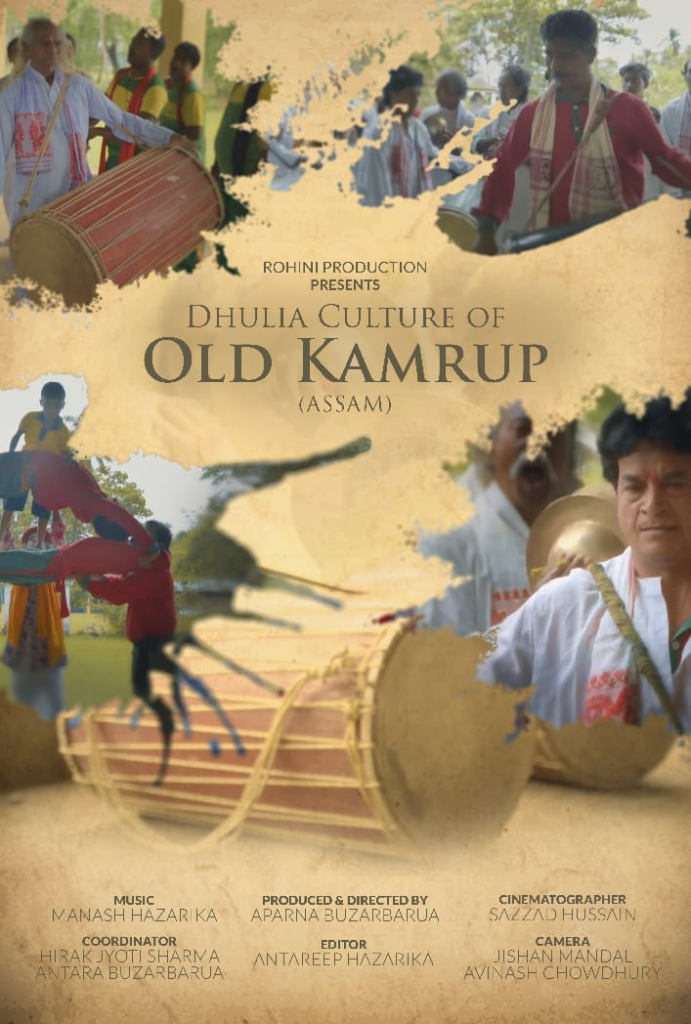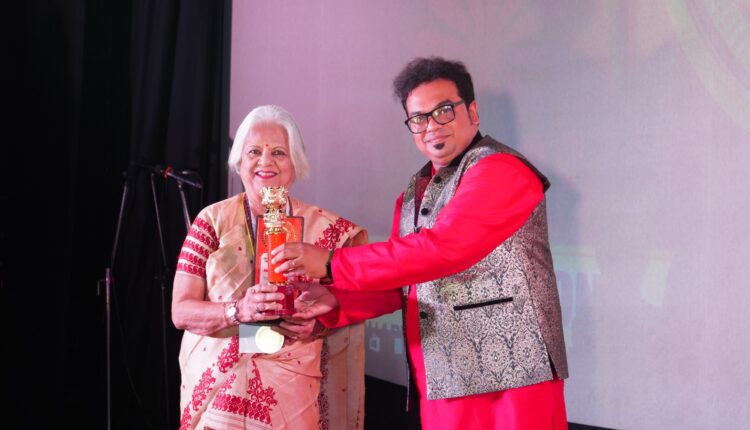Dr Aparna Buzarbarua’s Documentary receives Best Documentary Award
Prantik Deka
In a heartwarming news, ‘Dhulia Culture of Old Kamrup (Assam)’, a 26-minute long documentary, based on the traditional folk-art form of Assam, researched, produced and directed by Dr Aparna Buzarbarua under the banner of Rohini Production, has won the Best Documentary Award at the International Short Film Festival Award, which took place at the Swami Vivekananda Auditorium in Kolkata, recently. The award comprises a trophy, a memento, a medal and a certificate.

It’s our ultimate priority and an obligation to strengthen and elevate our age-old rich cultural heritage. The onus is on the responsible members of the society to protect and keep our culture alive by means of preservation. People cannot afford to neglect and alienate the arts, which are such invaluable resources, with apathy and indifference, but this is exactly what is happening with the dhulia culture of Assam, an age-old folk art which is diminishing rapidly as a result of dwindling interest and distaste among the young people, amidst the invading onslaught of modernisation and Western culture.
“I have tried to highlight the past and the present forms of Kamrupia Dhulia culture, various problems plaguing the community, etc, through the documentary. It is very important that we preserve this unique culture properly,” Dr Aparna Buzarbarua said.
An ancient art form, the genesis of which can be traced as far back as the Vedic era, as the records confirm the practices of people dancing and acting during that time in India, the antecedents of Dhulia culture can be found in the choirs and the puppet shows performed in ancient times.
During the Middle Age period, there were two types of art forms and dramaturgy, which flourished in India. One is performed in Sanskrit and the other is a folk form. But the folk based performances are much older than the Sanskrit ones. These two art forms were believed to be the roots of many consequent popular folk art forms, one of them is the Dhulia culture of Kamrup. Initially confined to the temples, later on, with time, the Kamrupia Dhulia performances became prevalent in various public meetings and religious ceremonies.
It’s a group performance, which consists of several notable elements, including playing drums, presentation of songs, dances, acrobatic performances, satirical skits, dramas and circus under its fold. Each group consists of about seven to ten drummers. Along with the drums, they use various traditional instruments like cymbals and a fife in their performances. In each group, there are some acrobats, capable of doing 20 to 25 acrobatics at a time, which are similar to those found in a modern circus. The documentary shows such performers showcasing rare expressions of strength and agility by holding and spinning a bicycle with their teeths, which are covered in careful detail.
The songs and skits are self composed and folk based. The skits performed in the colloquial language have found instant appeal with the audiences due to their engaging qualities.
‘Dhulia Culture of Old Kamrup (Assam)’ focuses on the origins and the evolution of the art form as well as its current position in Assamese culture. A mentor-disciple learning culture, Dhulia culture is basically transmitted down from one generation to the other, but in the contemporary times, young people are least interested in this culture, which has lost much of its sheen.
The documentary also prominently highlights the works of late Mohan Chandra Barman, better known as Mohan Bhaira, the renowned Sangeet Natak Akademi Awardee drummer and actor, who dedicated his life to the cause of Kamrupia Dhulia culture.
A leading exponent of Dhuliya culture in Assam, Bhaira developed an early interest in the culture, and joined a Dhulia group at the age of four. A visionary, who was extremely well-versed in all aspects of society, Bhaira was often considered the most creative performer who brought a tremendous amount of respect to the traditional Dhulia culture, raising its status on a national level.
More often than not, drummers are forced to live very meagre lives. They can’t always depend on their Dhulia performances for their livelihood. They are often forced to do odd jobs here and there. At various times, the financial strain of being out of work weighs heavily on their families. Bhaira, too, had to undergo extreme financial difficulties in his life. As he mostly performed in festivals or on special occasions, the rest of the time, he kept himself busy by cultivating, and taking care of poultry.
An honest effort has been made through this documentary to bring back the focus to the performing artistes hailing from the less privileged backgrounds and communities, who have survived the effects of modernity and commercialisation, and their ceaseless determination to find imaginative ways of attracting wide and varied audiences.
This documentary has basically been targeted to people across India and beyond with a hope that there would be stakeholders who would be willing to support the artistes to bring back their glory.
Dr Aparna Buzarbarua deserves immense praise and appreciation for bringing the unique Dhulia culture of Kamrup to the limelight through this documentary.
An accomplished music composer of the state, Dr Aparna Buzarbarua made this documentary with the funds that she received from the Silpi Award conferred by the state government in 2022.
“In 2004, I was invited to inaugurate the Kamrupia Dhulia show in the Gitanagar Ras Festival on the second evening of their three-day function. I was really mesmerised to see their performance, but was equally very sad when I came to know about their economic hardships,” Dr Buzarbarua says. Since then, she took it upon herself to do something for the Kamrupia Dhulia community. But due to lack of funds, she was unable to do anything for them. But after getting conferred with the Silpi Award in 2022, Dr Buzarbarua immediately decided to do a documentary film on their culture. “Accordingly, I went ahead with the project and completed the film. Dr. Krishna Barman came on board as a subject expert and helped me out. I’m grateful to Manash Hazarika, his son Antareep and my daughter Antara and other team members and the performers, as without their sincere efforts, it wouldn’t have been possible for me to make this project, which has now received the Best Documentary Award at the International Short Film Festival Award held in Kolkata.”
“When I stepped onto the stage to receive the award, the anchor looked at me in amazement, and being overwhelmed, he asked about my age. After knowing that I am 78 plus, he said, ‘You are really an inspiration for the new generation’, and requested the audience to join him in giving a huge round of applause to me. I truly feel honoured by this gesture, and this will be a memorable day for me as this is the first documentary of my life,” she adds excitedly.
Born and brought up in a culturally enriching environment in Tezpur, Dr Aparna Buzarbarua started her illustrious career as a Botany teacher at the Cotton College in 1969, and remained there till she retired as the Head of the Deptt in 2003. Dr Buzarbarua, who earned her Visharad degree in sitar from Bhatkande Sangeet Vidyapith, Lucknow, in the year 1981, has been regularly practicing Hindustani Classical music on the Sitar since 1971. Dr Bujarbarua, who has composed over 100 songs, collaborating with diverse eminent lyricists from the state, most of them recognized by All India Radio, has a rare distinction of being the first recognized female music director of AIR Guwahati in the year 2008. She has also authored a number of books.
It may be recalled that Dr Buzarbarua has also made generous financial contributions in the construction of a beautiful library built in memory of her husband Nagendra Nath Buzarbarua at the Kanya Mahavidyalaya in Guwahati’s Geeta Nagar.
‘Dhulia Culture of Old Kamrup (Assam)’s technical director is Manash Hazarika, who has also scored the background music, while the editing has been done by Antareep Hazarika, and the cinematography is by Sazzad Hussain. The film’s coordinators are Hirak Jyoti Sharma and Antara Buzarbarua. The camera operators are Jishan Mandal and Avinash Chowdhury.



798439 219452cool thanks for reis posting! btw are there feeds to your weblog? Id love to add them to my reader 657717
50118 944428I gotta favorite this internet site it seems handy . 430663